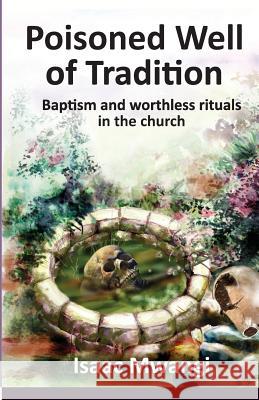Poisoned Well of Tradition: Baptism and worthless rituals in the church » książka
Poisoned Well of Tradition: Baptism and worthless rituals in the church
ISBN-13: 9789966172501 / Angielski / Miękka / 2013 / 154 str.
When anyone who is thirsty visits a well, they expect to quench their thirst and gain strength to sustain their lives. The church is meant to be a source of life, where those who are spiritually thirsty receive living water. But many are today disillusioned: Man-made rules, rituals and traditions have poisoned the well. How did this happen? The foundation for Christ's kingdom laid over the centuries has cleverly turned believers' minds to worldliness while retaining a spiritual appearance on the outside. In this book, the biblical basis of what a majority of Christians hold dear is held up to the scrutiny of scripture. The depressing results should cause serious concern among all Christians. A focus on materialism has progressively robbed Christians of the ability to grasp the abstract, spiritual truths contained in the New Testament. This poverty of understanding is so pervasive that every aspect of the Christian faith has been corrupted, leading to numerous false teachings and worthless rituals. This book aims at helping Christians to shed off this baggage and to focus on what real, life-transforming faith is all about. Many Christian leaders and writers have discerned God's move in our day and are actively involved in efforts aimed at restoration of the church to what it was in the first century. But they have failed to realize that the early church can only be an outpost on the way, not the destination itself. We have veered so far from the path of truth over the centuries that we needed to first check out this outpost in order to recover our bearing. But however commendable the efforts have been toward this goal, they are clearly insufficient. The destination we must aim for is well beyond the first century church: It is grander and more glorious. God wants the church to be restored to a higher benchmark - to that Body of Christ that the Father has always desired for His Son. In this regard, Christians must now stop asking themselves, "What can we learn from the apostles about the church? Rather, they must start asking, "What is the vision of the Father about the church?" We must pray for God to fill us with His vision of the Bride of the Lamb. Where the apostles in word and deed concurred with the Father's vision, then we rejoice. Whenever they deviated from the Father's vision for cultural reasons or due to their own human weaknesses, however, we have an obligation to refuse to follow their example, because our eyes are fixed not on the apostles but on Christ. This represents a seismic shift - from focusing on a return to first-century Christianity to seeking the kind of worship that has always existed in the mind of the Father before time began. The story of the entire bible is hinged around the restoration of all things to what God envisioned right from the beginning of creation. When "he chose us in him before the creation of the world to be holy and blameless in his sight (Ephesians 1:4)," He had a plan about how His Son would be glorified. We need to fix our eyes on that plan and vision. In so doing, the book does not advocate a departure from scripture. The Father's vision is wholly revealed in the bible. All we need to do is to elevate the Father's vision above the teaching of the early apostles as well as our own traditions. Jesus placed a great deal of emphasis on the foundation that is laid for God's work in the lives of believers. He spoke of a wise man who built his house on the rock and a foolish man who built his house on sand (Matthew 7:24-26). He used the parable of the sower (Mark 4:1-20) to illustrate the same point: That the soil into which the word is sown will determine whether it bears fruit or not. Jesus did not lay a foundation of human traditions; our task is to destroy them. A spiritual approach to baptism, once grasped, makes it easier for the Christian to then live in the freedom that Christ has purchased for all who believe in Him, free of all rituals and traditions of men.











